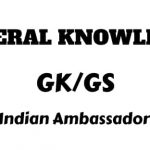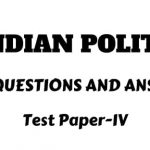Indian Constitution MCQ Questions for UPSC Examinations
Test Paper-III
Learn Indian Polity for Civil Services Examination, SSC, Group I, Group II and Railways examination with MCQ question and answer, Get complete 60 practice Test papers ebook from Fdaytalk ebooks
50 MCQ Indian Constitution MCQ Questions
Indian Polity Test Paper 3
1) The term “preamble“ refers to?
a) Introduction to the constitution
b) Preface to the constitution
c) Ending part of the constitution
d) Structure of the constitution
A) a ,b ,c, d B) a,b C) c,d D) only d
Ans: B) a,b
2) Preamble to India constitution based on which resolution it was drafted?
a) Objective resolution drafted by Nehru and adopted by Constituent Assembly
b) Preamble resolution drafted by Nehru and adopted by Constituent Assembly
c) Nehru resolution drafted by Sardar Patel & adopted by the constituent assembly
d) None of the above
ANS: a) Objective resolution drafted by Nehru and adopted by Constituent Assembly
3) By which amendment act, 3 New words were added to the preamble?
a) 44th constitutional amendment act 1976
b) 42nd constitutional amendment act 1976
c) 42nd constitutional amendment act 1978
d) 44th constitutional amendment act 1978
Note : 3 New words: socialist, secular and integrity
Ans: b) 42nd constitutional amendment act 1976
4) Preamble contains
a) Source of authority of the constitution
b) Nature of India state
c) Objective of the constitution
d) Date of adoption constitution
e) All the above
Ans: e) All the above
Note: Date of adoption of constitution: 26 Nov 1949
5) What are the keywords in preamble?
a) Sovereign, socialist
b) Secular, democratic
c) Republic, justice
d) Liberty, equality, & fraternity
e) All the above
Ans: e) All the above
6) What is meant by Sovereign?
a) Independent state
b) Dependent state
c) Neither dependent nor Independent states
d) Both
Ans: a) Independent state
7) Indian constitution provides
a) Referendum representative parliamentary democracy
b) Initiative representative parliamentary democracy
c) Recall representative parliamentary democracy
d) Representative parliamentary democracy
Ans: d) Representative parliamentary democracy
8) What is meant by representative parliamentary democracy?
a) Executive responsible for the legislature
b) Legislature responsible to the executive
c) Legislature responsible to the people
d) Executive responsible for the people
Ans: a) Executive responsible to the legislature
9) The ideals of liberty, equality & fraternity in preamble is taken from?
a) French revolution 1789-1899
b) French revolution 1789-1799
c) Indian revolution
d) Free movement,1942
Ans: b) French revolution 1789-1799
10) Constitution promotes fraternity by?
a) Single citizen ship
b) Fundamental duties
c) Voting in elections
d) A&B
Ans : d) A&B
11) Who stated as preamble is the horoscope of our governing democratic republic?
a) Nehru
b) Alladi Krishna swami 1 year
c) KM Mushi
d) B R Ambedkar
Ans: c) KM Mushi
12) Who stated as “preamble” to our constitution expresses what we had thought or dreamt so long?
a) Nehru
B) Alladi Krishna Swami Iyer
c) KM Mushi
D) B.R Ambedkar
Ans: b) Alladi Krishna Swami Iyer
13) In which case, the supreme court opined that preamble is not a part of the constitution?
a) kesayananda case, 1973
b) Berubari union case, 1960
C) Indian union case, 1976
d) Lic of India case, 1995
ANS: Berubari union case,1960
14) In which case , supreme court opined that preamble is part of constitution ?
a) Kesavananda Bharati case , 1973
b) Berubari Union cas34e, 1960
c) Indian Union case, 1976
d) LIC of Indian case, 1995
e) A & D
ANS: A & D
15) How many times preamble has been amended ?
a) Only one time
b) 2 times
c) 3 times
d) 4 times
Ans: a) only one time
16) When did India became member of UNO?
a) 1946
b) 1945
c) 1949
d) 1950
ANS: B) 1945
17) The term “Democracy” is derived from
a) Greek world Demos & kratia
b) French world Demos & kratia
c) German world Demos & kratia
d) Spanish world Demos & kratia
ANS: b) French world Demos & kratia
18) Refrerdum : It is procedure where by a proposed legislation is referred to the electiorate for settlement by their direct votes
19) Initiative: It is a process in which people can propose bill to the legislature for enactment
20) Recall: By this method, voters can remove a representative or an officer before expiry of his term when he fails to discharge his duties properly
21) Plebiscite: In this process, obtaining the opinion of people on any issue of public importance
22) PART 1 of constitution of India, Article 1 to 4 deals with
a) Citizenship
b) Union & states
c) Union and its territory
d) All the above
ANS: c) Union and its territory
23) Article 1 of Constitution of India describes India as?
a) Union of states
b) Federation of states
c) Hindu country
d) Bharat Hindu country
ANS: a) Union of states
24) According to Article 1, Territory of India classified as
a) Territories of the states
b) Union territories
c) Territories acquired by India
d) All the above
ANS : All the above
25) Since commencement of Constitution , India acquired foreign territories were
a) Goa
b) Puducherry
c) Sikkim
d) All the above
Ans: d) All the above
26) According to Article 2 of constitution of India , Parliament as power of
a) To admit into the union of India new states
b) To establish new states
c) Internal readjustment of territories of states
d) A&B
ANS: d) A&B
27) According Article 3 of constitution of Indian , Parliament can
a) From new state by separation territory from any state or by uniting two or more states
b) Increase the area of any state
c) Diminish the area of any state
d) Alter the boundaries of any states
e) Alter the name of any state
f) All the above
Ans: f) All the above
30) Conditions for implementing Article 3 by parliament
a) Bill can be introduced in the parliament only with prior recommendation of President of India
b) Before recommending bill, the president has to refer the bill to steps the legislature for its views within a specified period
NOTE: In the case of union territory, No reference need to be made to concerned legislature, parliament can itself take any action
31) To pass state reorganization bills in parliament requires?
a) Simple majority
b) 2/3rd Majority
c) 12/3rd Majority
d) Full Majority
ANS: A) simple majority
32) By which article, constitution of India can be amended?
a) Article 365
b) Article 366
c) Article 3467
d) Article 368
ANS: d) Article 368
33) MATCH THE FOLLOWING
A) Article 1 a) Formation of new states
B) Article 2 b) Union states
C) Article 3 c) laws made for establishment of new states
d) Article 4 d) Establishment of new states
A) D, A, C, B
B) B, A, C, D
C) B, D, A, C
D) B, D, C, A
ANS: C) B,D,A,C
34) Can parliament diminish the area of states under article 3 & code to a foreign Country?
a) Yes
b) No
NOTE: Indian territory can be ceded to a foreign country only by amending constitution under article 368
35) Settlement of boundary disputes between Indian & another country requires
a) Constitutional amendment
b) Simple majority amendment
c) Not require any constitutional amendment
d) None of the above
ANS: Simple Majority
36) 3 Princely states joined India by
a) Hyderabad – police action, Junagarh – referendum, Kashmir – instrument of accession
b) Hyderabad –referendum, Junagarh – instrument of accession , Kashmir – police action
c) Hyderabad – police action, Junagarh – Instrument of accession, Kashmir- Referendum
d) all 3 states joined with police action
ANS: a) Hyderabad – police action, Junagarh – referendum, Kashmir – instrument of accession
37) Government of India appointed which of the following committees to examine reorganisations of states on linguistic basis?
a) Dhar Commission
B) JVP committee
c) JVR committee
d) a& b
ANS: A&B
38) Which committee supported reorganation of states on linguistic basis?
a) Dhar commission
b) JVP committee
c) Both
d) None of the above
ANS; d) None of the above
39) Government of India appointed Fazl Ali commission, Dec 1953?
a) its 3 member states organization commission
b) Accepted reorganization of sates based on language
c) Accepted one language – One state
d) A & B
ANS: d) A & B
40) Fazl Ali commission
a) appointed in Dec 1953
b) 3 Members commision under chairmanship of Fazl Ali
c) other member –KM Panikkar, HN Kunzru
d) suggestedthe abolition of 4- fold classification of states
41) In 1960, Bilingual state of Bombay divided into
A ) Maharastra & Uttar Pradesh
B) Maharastra & Gujarat
c) Maharastra & goa
d) Mumbai & thane
ANS: B) Maharastra & Gujarat
42) FACTS ABOUT Dadra & Nagar haveli ?
a) Portuguese ruled till 1954
b) Administrated by people chosen administrator till 1961
c) By 10th constitutional amendment act, 1961 Dadra & Nagar haveli converted into union territory
43) FACTS ABOUT Goa, Daman & Diu
a) Portuguese ruled till 1961
b) India acquired these territories by police action in 1961
c) These territories constituted as union terriory by 12th constitutional amendment act, 1962
d) By Goa, Daman and Diu reorganisation act 1987, Goa conferred statehood and daman & Diu made separate union territory
44) Facts about Puducherry
a) French ruled till 1954
b) India Acquired Puducherry & administered as ”acquired territory” till 1962
c) By 14th constitutional amendment act, 1962 incorporated Puducherry in India union
45) Facts about Nagaland
a) Nagaland state formed by taking naga hills & Tuensang area out Assam state
b) Nagaland state formed in 963
46) Facts about Haryana, Chandigarh & Himachal Pradesh
a) In 1966, Punjab state bifurcated to create Harayan state & union territory of Chandigarh
B) On recommendation of Shah Commission 1966, Punjabi speaking area was constituted into Punjab state
C) in 1971, the union territory of Himachal Pradesh elevated to the status of statehood. it became 18th state of Indian union
47) Change of Names
a) IN 1950, United provinces to Uttar Pradesh
b) in 1969, Madras to Tamil Nadu
c) In 1973, Mysore to Karnataka
d) In 1973, Laccadive, Minicoy and Amindivi Island to Lakshadweep
e) In 1992, Union terrtiry of Delhi to National Capital Territory of Delhi
f) In 2006, Uttaranchal to Uttarakhand
48) Facts about Sikkim
a) Till 1947, Sikkim state ruled by Chogyal
b) With 35th constitution amendment act 1974, Sikkim given an “associate state” status with adding new article & 10th schedule
c) in 1975, Sikkim people voted for abolition of the institution of chogyal by referendum
d) In 1975, by 36th constitutional amendment act, Sikkim elevated with full-fledged state status & it became 22nd state of Indian union
49) A Person can become president of India, if
A) He is naturalized citizen
B) He is a citizen by birth
c) a and b
d) No conditions for eligibility
Ans: c) a and b
Note: in America, only for citizens by birth is eligible for the office president
50) Which part & articles deals with citizenship in the constitution of Indian ?
a) Part III, Article 5 to 11
b) Part II, Article 5 to 13
c) Part II, Article 5 to 11
d) Part I, Article 5 to 11
ANS c) Part II, Article 5 to 11
51) Losing citizenship according to citizen ship act, 1955
a) Renunciation
b) termination
c) deprivation
d) ALL The above
ANS:D) ALL The above
Learn More about Indian Constitution MCQ Questions
Link 1: Indian Polity and constitution Practice Test Papers

